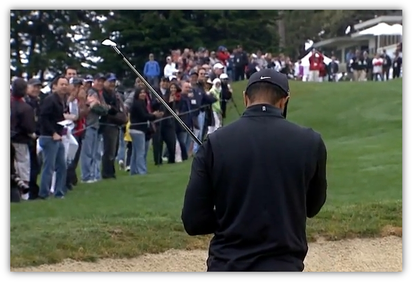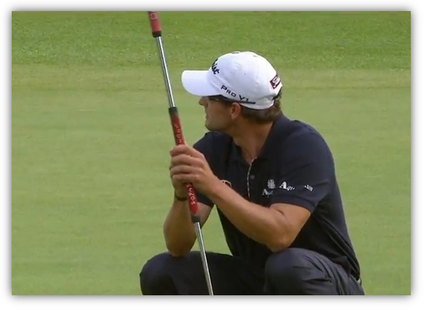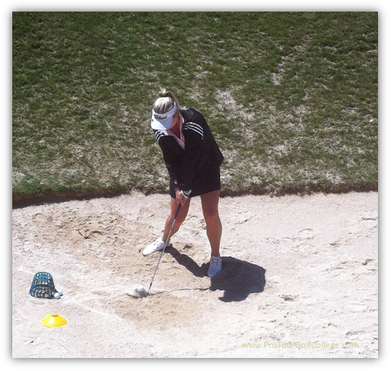 Golf is a frustrating and infuriating game as much as it is an inspiring and empowering game. Or is it? When I flick through the old golf books in my library from around 100 years ago the authors talk about the game much the way we do. They discuss with amusement the frustrated, frenzied and frantic golfers struggling with the adversity that is the game of golf. They make light of the way golfers work themselves into an emotional wreck. We don’t laugh at it as much anymore; it is far too serious a game for that. And that may be the problem. Why is golf so frustrating? Why does it make golfers feel so emotionally weak and vulnerable? Do we get frustrated because golf lulls us into a false sense of security? Probably. Do we get frustrated because we try to play this game as if it can be perfected? Yes for many this is true. We are golf addicts in a lot of ways because we get hooked on the feelings that make us believe that we can be a lot better than we are. This is especially the case when we hit golf shots that travel from the club-face like ballistic missiles that soar effortlessly into the sky like a Boeing 777.  But golf by its very nature is a game of ups and downs. One golf shot that you are very happy with might be followed up with a disastrous one that leaves you scratching your head wondering what just happened. This is the nature of golf. Let me say it again, “this is the nature of golf.” There is a duality of sorts with the good golf shots at one end of the performance scale and bad golf shots at the other end; and for many advanced and elite golfers, not much fun in between. But it doesn’t have to be this way, after all, first and foremost golf is a game of skill, and you can go about learning to develop your golf skills patiently accepting the normal up’s and down’s along the way, or not. I think it is important to learn a key distinction that learning golf skills is not the same as learning something from a textbook that you need to remember in a test the next day. Golf skill learning requires deliberate repetitions correctly applied many times over until you reach a stage of automaticity. Automaticity is a fancy word that simply describes learning a golf skill to a stage where you don’t have to consciously think about it anymore. A golf skill is automatic when there is just one step left from stimuli to retrieval. What this means is you can decide on the appropriate shot that fits the situation and then play it. No thinking about “how” anymore. This seems to be the toughest part of the journey for many elite golfers, from learning the golf skill to forgetting about it, and we find that many serious golfers simply do not appreciate just how much work has to be done to bridge this performance gap.  In our experience working with thousands of golfers this appears to be the part of learning that many elite golfers struggle with the most and we also think that it is one of the main reasons that they change from one golf instructor to another. They get to a stage of arrested development where it seems that whatever they do, they are not making progress. They don’t see the scores in golf tournaments getting better so they go searching for another way. They are under the mistaken belief that there is a better—faster way to golf success. What we know is that you have to put the hours into it, and that the toughest part of the journey is getting from the conscious stage of learning to the unconscious stage. When they are going through the conscious stage and developing their confidence and experiencing the normal failure, frustration and annoyance they want to escape from it, instead of understanding the stage they’re at and becoming more determined to get their golf skills to automaticity in tournaments. So let me be very clear about this because I want to help you to manage this frustration and aggravation and help you to keep making progress with your golf. You cannot serve two masters in golf. You need to develop your technical skills and then develop your shot-making skills. For you to reach a stage of automaticity you need to practice your golf skills for hundreds of hours. That is a simple fact. Now you may accept this or dismiss it. That is entirely your choice but it is the truth. No golfer who ever achieved success in this game did it without an enormous amount of practice and determination. If you want to develop golf skills that repeat when it really matters to you in a tournament then build a strong technical base for all your golf skills to rest upon. Learn the technique with the help of your golf instructor to a high level of competence and add a target to this process when you reach the stage of being able to perform the skill without a lot of thought. Flawed golf techniques fail as easily as correct golf skills that aren't learned enough. So practice your golf technique with your full attention, and never ever try to speed up the learning process. You might be able to execute golf shots successfully on the golf range just the way you want, but the litmus test is doing it in a tournament when it really matters. You have to understand just how much practice of your golf skills has to be completed to reach automaticity.  If you want to be a top class amateur golfer or a professional golfer then you just have to realize that there are many skills to practice---not just your favorite ones. From short putting to long putting to level putts and side-hill putts, chips, pitches, sand shots, trouble shots, approach wedge shots to tee shots and iron shots. The list goes on. Think about it for a moment, how many different golf strokes do you have to practice and develop to the level of automaticity? Now think about how long it is likely to take to practice all those different skills for you to reach the level you aspire to. What makes you think that you can rush the learning process when there are so many golf skills to learn to automaticity, so you can play confidently in the tournaments you compete in? If you get frustrated and even angry when you are practicing and playing golf, then I strongly suggest that you do one of two things right away:
This game is tough mostly because of the way golfers go about practicing and learning their golf skills. So take each golf skill that you are learning one step at a time and be patient. You will have to practice the different golf skills for many hours to reach the stage where you don’t have to think about them anymore. You are growing golf skills much like growing a tree in your garden. You can tell the tree to grow faster as much as you want, but it will grow on its own terms, and in its own time, and so will your golf skills. There is a reason why patience is an advantage in learning golf skills. Those who have achieved the exalted state of learning skills and performing with them confidently in tournaments know that you must invest the practice hours into growing your golf skills completely. There is no other way. Put the practice hours in, be patient, be purposeful, and be persistent because this is the only way that you can reach the exalted state of golf skill nirvana. Lawrie Montague and David Milne - Pro Tour Golf College Your Success On Tour is Our Business 2/11/2013 10:26:15 am
Thanks John I'm really glad you enjoyed it and as always for taking the time to comment and David and I appreciate your support. Comments are closed.
|
Archives
June 2019
|
Proudly Supported By
Copyright © 2011 - 2018 Pro Tour Golf College
Website Managed By Golf Performance Media
All Rights Reserved
Website Managed By Golf Performance Media
All Rights Reserved


 RSS Feed
RSS Feed



